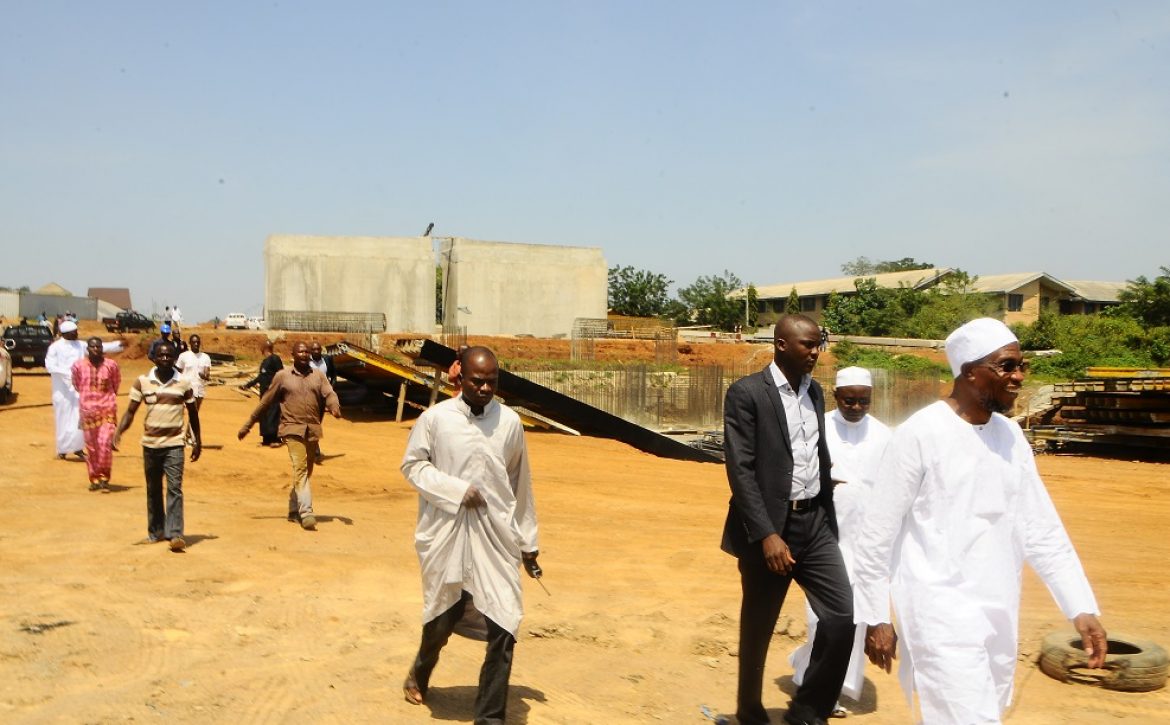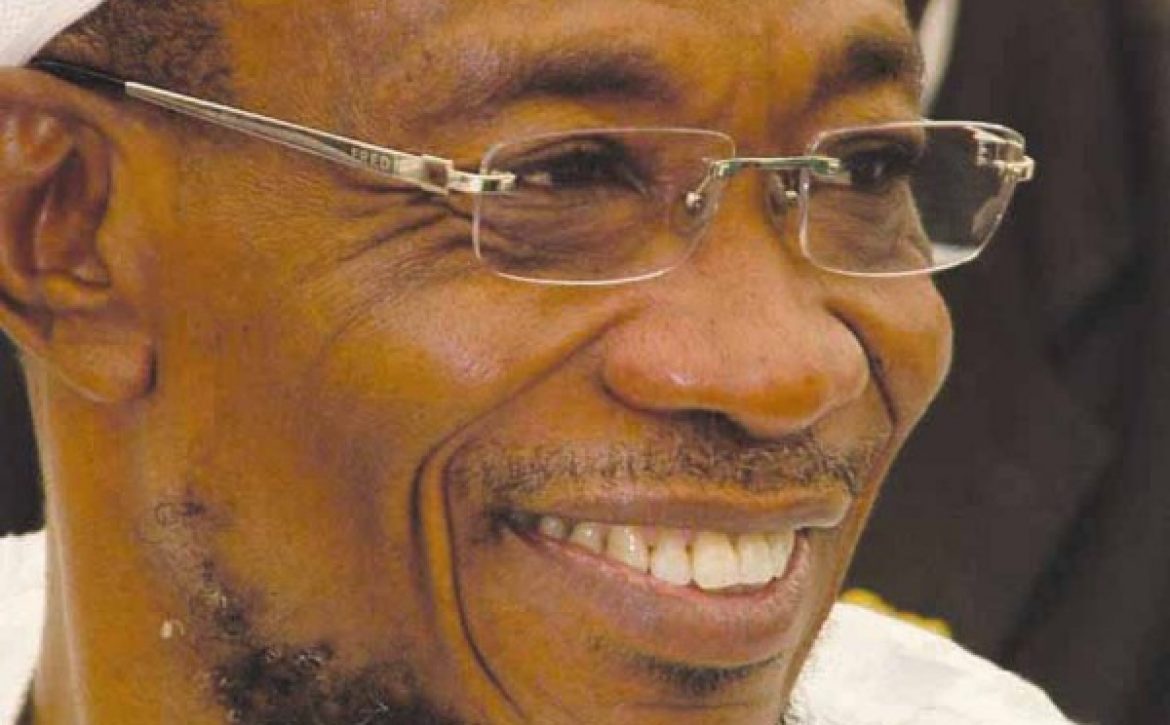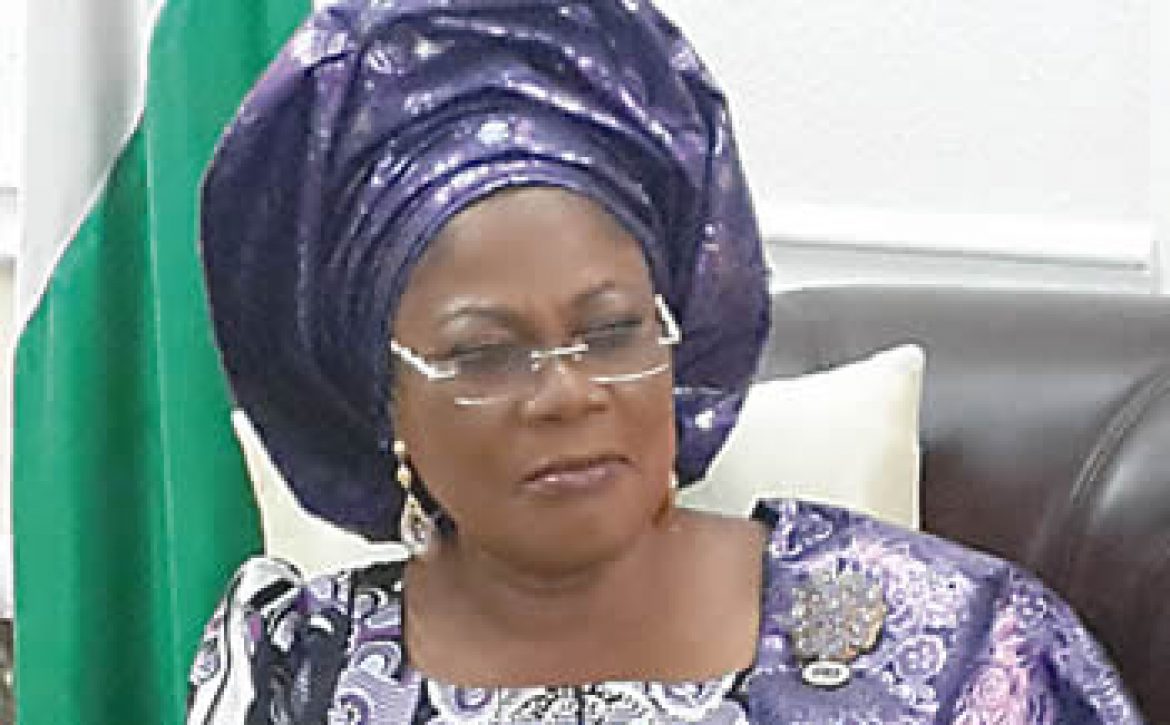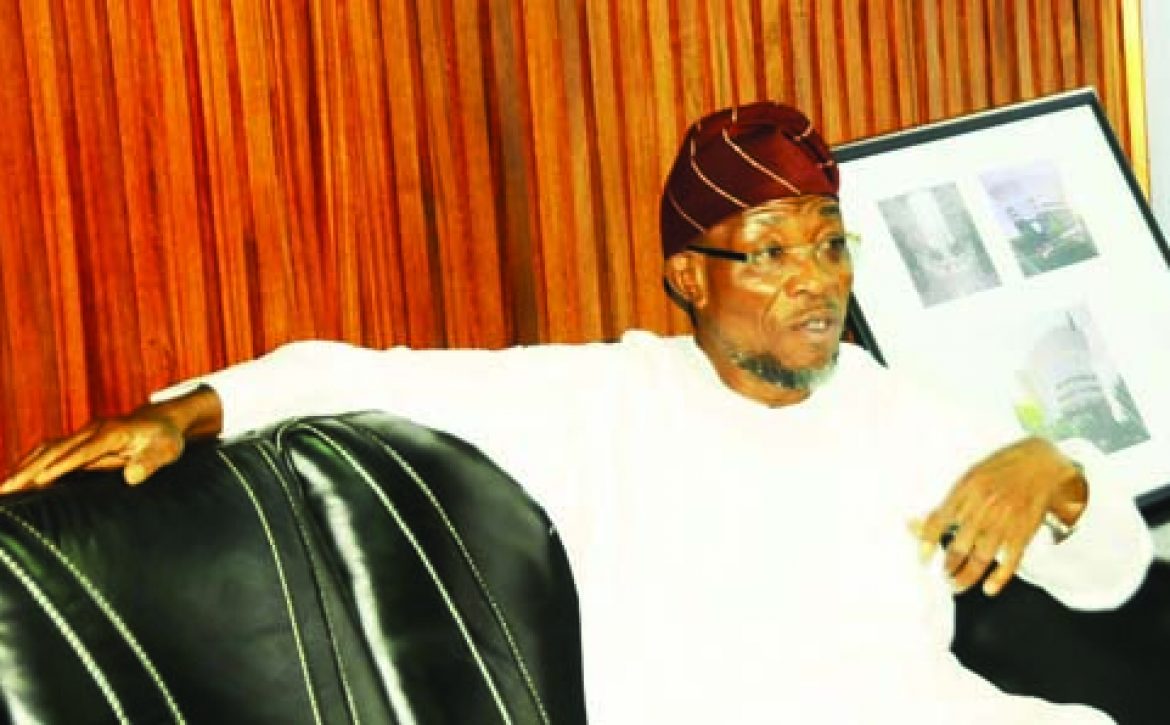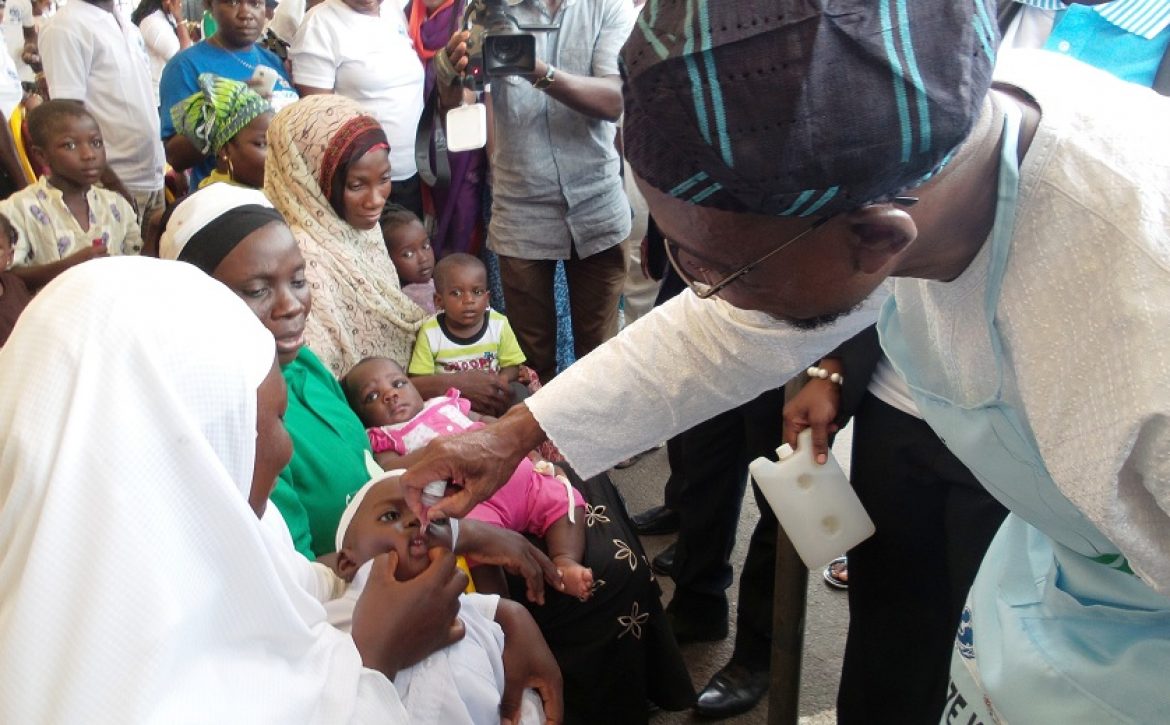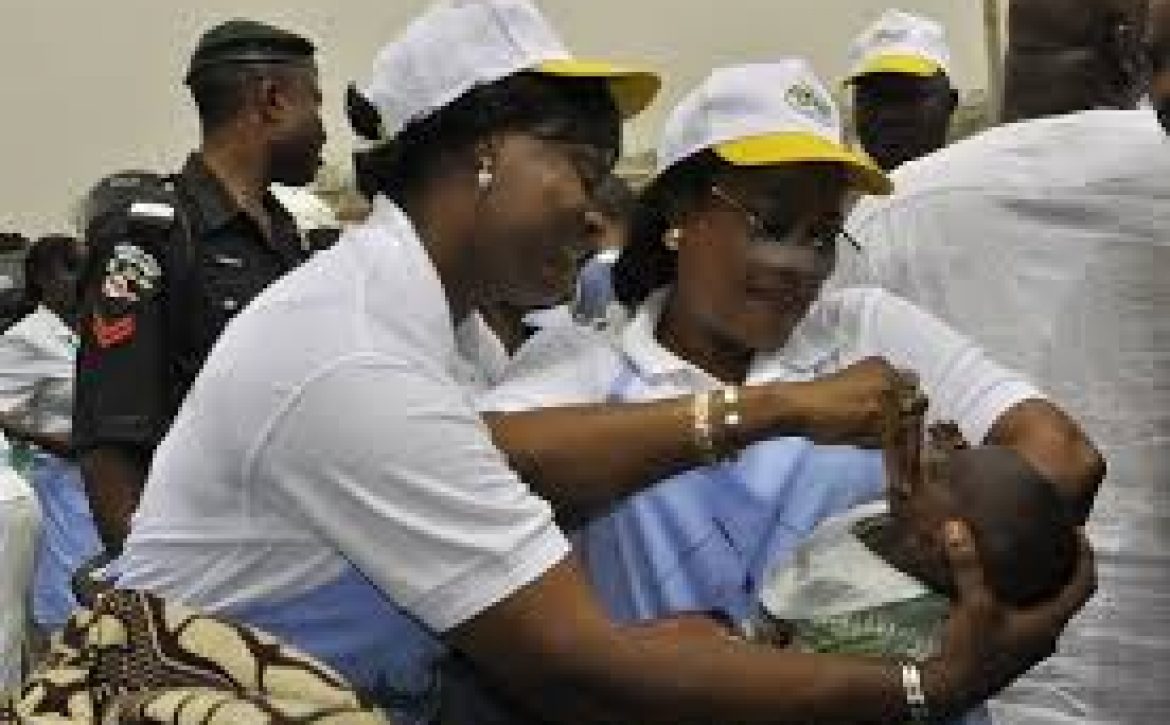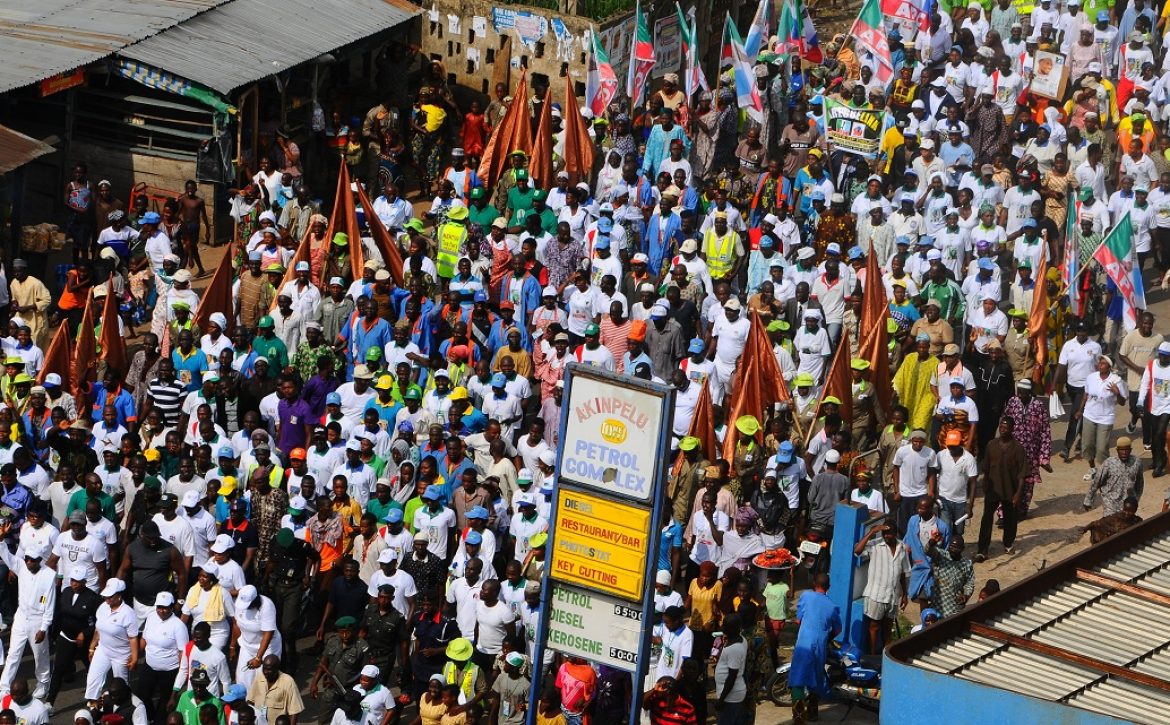Governor, State of Osun, Ogbeni Rauf Aregbesola is photographed during an Inspection visit to the on-going construction of one of the major bridges on the East by-pass road, at Ofatedo via Osogbo the State of Osun at the weekend


Category: Politics

The State of Osun has indeed seen a turn around and has you go round the state, you see the level of work and how people express happiness in all the nooks and crannies of the state on the performance of the current All Progressives Congress administration of Ogbeni Rauf Aregbesola. The results speak for itself.
Chief Obafemi Awolowo once ruled and made education a priority and looking round the defunct Western States, the crop of academics; intelligentsia and the people who gave the civil service credit were from the State of Osun. This gave confidence to other parts of the country which made them believe that the Western Region have nothing to worry about because it had everything it needed to grow.
Within the committee of other regions, namely Northern, Eastern, Mid-Western and Western Regions, it was education that gave the Western Region the lead, it gave her an edge over other regions. But when the corrupt politicians came in, they turned the clock backward, making it a place where anything goes. We had to say enough is enough. This is part of the things that led to educational restructuring by Aregbesola’s administration who went about putting the right structures in place. It had to start from the foundation, the primary school level where we can nurture them into dynamic brains. Where you grow up and how you grow up matters.
A child is a product of his environment. We agree that there are exceptionally in-born brilliant ones, but when a brilliant child that has been in school is made to hawk in the morning and go to school when the brain is tired, such a child will not measure up. The current structure in most of the schools are not in any way conducive for nurturing good brains and minds. Thus the need for a consultation by the government of Aregbesola. An educational summit headed by Prof. Wole Soyinka was put in place. The programme was formulated on how education can make a total man, the ‘Omoluabi’, and the resolutions were was made the core focus of this administration.
The current structures in schools were dilapidated which necessitated the rebuilding for the pupils and students. The schools were then categorised into elementary, middle and high schools also providing the students with uniforms. This action by the government has gotten it a lot of commendation, exposure and accolades from local and international bodies like UNESCO, World Bank and others especially for having the courage to restructure education. The garment factory for uniforms has provided jobs for over 3,000 people. This shows how the change in the education sector has empowered not only the students but even the people of the State. Opon Imo (tablets of knowledge) which is also a novel innovation by the present administration is being applauded all over the world and has attracted several local and international awards
Aregbesola has been at the helms of affairs for just 30 months and yet, with so much achievements to show for this. The blind can see and the deaf can hear about the level of changes Aregbesola has brought to Osun. You don’t need to tell them that the market has ended, so says an adage. What Aregbesola has done has done in Osun has endeared him to the populace and would earn him a second term in office. By way of comparison, what Aregbesola has done in 30 months has outweighed the achievement of his predecessor who ruled for 90 months.
When the late sage, Chief Obafemi Awolowo started free education, they criticised him. But the system has produced the best Professors, Engineers and what have you in this country. They are all old men now, but they got education through Awolowo’s policy. The long effect of returning education back to its lost glory in Western Nigeria is what Aregbesola has started.
When Aregbesola came in, N18.38 billion was borrowed by the PDP led administration of Oyinlola and shared as booties. But Aregbesola came and stopped all financial recklessness. He recovered the money, re-arranged with financial institutions and rescued the situation from an angle of financial re-engineering. Instead of phony projects of stadia development, roads are daily being constructed in every nook and cranny of the state. It is thus surprising that they wonder where Aregbesola is getting money to do all the projects from. They should have asked themselves what they were doing with the money accruing to the state during the seven and a half years that they ruled the state without development.
On the uproar on the reclassification of schools, this has been given it a direction. Those who did not know have realized that they were in error. Conversations and negotiations have gone on with stakeholders at every level and the people are more informed. For 38years now, the government has taken over the schools and has since been responsible for the administration, employment of teachers, payment of salaries, emoluments of teachers and support staff, but only too tolerant to have allowed the names of the schools to continue. Check it, be it Fakunle, Catholic, Anglican, Baptist, you see that no private school has been affected by the reclassification exercise.
On youth empowerment, Aregbesola saw the need and importance to give the Youth something to do and be proud of and this army of unemployed youths can either serve as a threat or pride to the State. He developed a program that as also been adapted by the Federal Government in their YESSO initiative. It takes a visionary leader like Aregbesola to be able to take youths away from the streets and get them engaged. The Nigerian Defence Academy undergraduates in Osun recently, The Coordinating Minister for Economy, who is also the Minister for Finance, Dr. Ngozi Okonjo-Iweala, World Bank operatives were all in Osun to appraise our youth employment programme and from their findings, they disclosed that it has drastically reduced crime in the state and definitely empowered the people.
Aregbesola is not a man who will tell you that the government would do what it doesn’t have the capacity to do. At the town hall meeting in Iwo (Gbagbadekun), where the governor and other political office holders interact with the monarchs and the people at the grassroots, the people of Iwo requested for a university from the governor. He told them that his administration has no capacity to build a university for them as what he could do was to restructure and put the primary and secondary school education on solid footings. He further enjoined them to work in tandem with Bowen University in the town to make it grow and develop.
The same happened in Ile-Ife where the monarch endorsed Aregbesola’s educational policy and reminded him that people scolded and criticised Awolowo; but when the success reached its peak, they all identified with him. Aregbesola is progressive and all that interests him is anything that would bring progress and development to Osun.
All the above point to the fact that Aregbesola would be re-elected for a second term in office by the good people of the State of Osun. The APC led Government of Ogbeni Rauf Aregbesola has done so much, it has fulfilled its promises to the people the people will give their mandate again. Governor Aregbesola is not perturbed. He is as solid as the rock of Gibraltar. Osun 2014? There is no shaking.
The State of Osun is for everyone, the opposition should also come closer, they should come on board and participate in the positive development of our dear state so that present and future generations would continue to remember them for good.
Adapted from Barrister Kunle Oyatomi’s interview with DAILY NEWSWATCH

The Government of the State of Osun has said it will do everything possible to support farmers to ensure abundant food production in the state.
Dele Ogundipe, the Senior Special Assistant to the Governor on Quick Impact Intervention Programme (QIIP), said this on Saturday in Osogbo.
He said the government would continue to support the Piggery Farmers’ Association to ensure abundant meat production. He also urged pig farmers to support the state government’s vision toward improved food production to reap more gains.
According to him, the support would enable the farmers to enjoy QIIP loans through the Ministry of Agriculture and Food Security.
Ogundipe revealed that the state government had started Artificial Insemination (AI) of female pigs in the three senatorial districts of the state, saying the government spent huge amount of money on the exercise.
He advised pig farmers not to see the business as a way of boosting food production only, but as a job and wealth creation venture.
BUSINESS NEWS

The government of the State of Osun has rewarded one Mrs Christianah Opeyemi Adeloye, a Part Two medical student of University of Ibadan, who came first in 2011/2012 Joint Admission Matriculation Examination Board (JAMB) in Nigeria.
According to the deputy governor of the state, who also doubles as the State Commissioner for Education, Otunba (Mrs) Grace Laoye-Tomori, at a short ceremony in honour of the recipient in her office in Osogbo, “Miss Adeloye has done the State of Osun proud, as she towered above all the candidates, who sat for 2011/2012 Joint Admission Matriculation Examination Board in Nigeria.”
She added that the recipient had imbibed the culture of Omoluabi, which the people of the state are noted for by excelling in her academic pursuit.
The deputy governor added that Professor Akinyinka Omigbodun made case for the recipient, as the state government was not aware of her feat.
In her word: “We did not know that you’re an Osun indigene, as you did not school in our state, but I want to assure you that now our public schools in the state are fit for academic excellence, as we’ve upgraded our schools and they are better-equipped for academic work”.
She also commended the parents of the recipient for the moral and financial support which made her to excel among her colleagues.
The deputy governor then used the occasion to call on all Osun indigenes to patronize public schools in the state, as the government of Ogbeni Rauf Aregbesola has overhauled the education sector to compete favourably with any first class standard school in any advanced country.
In his message of gratitude to the government of the State of Osun, the father of the recipient, Evangelist Emmanuel Adeloye, a leader of Celestial Church of Christ in Ilaro, Ogun State, commended the effort of the state government for implementing its six-point integral action plan, which had turned the fortune of the state within a short time.
He added that the state indigenes all over the federation are proud of the current administration in the state and also support its laudable programmes and policies. Adeloye therefore, prayed for God’s guidance and protection over the governor and the state as a whole.
Present at the deputy governor’s office during the presentation was the Secretary to the State Government, Alhaji Moshood Adeoti, Special Adviser to the Governor on Education, Honourable Niyi Idowu, the Permanent Secretary of the State Ministry of Education, Mr Olayinka and the parents of the recipient.
OSUN DEFENDER

From a paltry N300 million a month less than three years ago to N1.6 billion now, internally generated revenue (IGR) in the State of Osun will appear to have taken a quantum leap.
This, of course, cannot be in absolute terms. Compared to Lagos that now does no less than N15 billion a month and is set to hit the N20 billion mark, N1.6 billion monthly seems small. But the news is not Osun’s present IGP in absolute terms. It is even not its comparison with Lagos, brother states they may be.
The news is rather about where Osun was coming from, and the strides it has made, less than three years, under a government that is focused and which nevertheless inherited a near-paralytic infrastructure from a previous government, which was in power for more than seven years.
Indeed, it is from this standpoint of near hopelessness in government that the Osun current IGP triumph must be viewed and celebrated. The Aregbesola administration has done well. So it is kudos to the governor and his team.
But as the reward for hard work is even more hard work, they must know that it is only a sweet beginning. They should therefore also aim at an even sweeter ending. From their performance these three years past, they are well positioned to doing it. They must grab this historic opportunity to make a difference and modernize Osun for good.
Still, what is responsible for this near-meteoric rise in Osun IGP? Some say it is sounder husbandry of Osun resources. This cannot be wrong. To assume office under those debilitating circumstances and yet engage 20, 000 youth volunteers under the Osun Youth Employment Scheme (OYES) was well and truly amazing. Now, to see the second batch of OYES literarily fall upon their jobs, menial as it is, even with their educational attainments, shows a positive improvement in the collective ethos of Osun people.
Still on good husbandry of state resources, that the Aregbesola government has embarked on massive infrastructure and urban renewal programmes, the most extensive and ambitious in the history of the State of Osun, is well and truly breath-taking.
It almost sounds as if the state is experiencing positive spiritual pay back: it is as if the state is getting compensated, in arrears and on the double, for past misrule that had resulted in stagnation. In all sectors of the Osun economy – education, health, agriculture, roads, environment and rural development, just to name a few – something new is happening.
Even in commerce, something big is about to happen with the impending launch of the standard measure for grains, to further instill the ethos of honesty and integrity in the Osun market folk.
This development is intended to make Osun the hub of commerce, between the South-West and the northern parts of the country, where in Osogbo, products and produce can be bought at Lagos prices.
That in itself would reclaim the old glory of the railway-linked Osogbo as a commercial nerve, next only to Ibadan and Lagos in the old Western Region. So, from an economic backwater which inhabitants groan with moans and regret, Osun, with its futuristic infrastructure under construction, is on its way to being a competitive player on the economic front.
But while doing all these, the government is also building its tax base. Indeed, the climb in IGP, aside from good resource husbandry, is also due to taxable economic activities. The more people witness upswing in facilities, the more they are convinced to pay tax.
The more tax payable, the greater the possibility of higher IGP and even more facilities. This economic growth, other things being equal, in due course translates to development and development itself translates to prosperity.
The Osun rags-to-riches story in IGP only proves that a government can only boost its taxable earnings only if it invests in its own economy by boosting infrastructure: physical (in the short run) and social (in the medium and long run). That is why Nigeria’s curious federalism of ‘revenue allocation’ makes nary any economic sense.
Even with its puny resources, the Aregbesola government has proved the almost limitless possibilities of the Osun economy. But it is early days yet. The government should continue on these winning lanes. That is the logical and reasonable path to socio-economic development.
OSUN DEFENDER

The Governor of the State of Osun, Ogbeni Rauf Aregbesola, has congratulated the national Under 17 football team, the Golden Eaglets, for winning the 2013 edition of the FIFA under 17 World Cup in the United Arab Emirates (UAE) after thrashing their Mexican counterparts 3-0 in the final played in Abu Dhabi on Friday.
In a release from the Director of the Bureau of Communications and Strategy, of the Office of the Governor, Semiu Okanlawon, Governor Aregbesola also congratulated President Goodluck Jonathan; the Minister of Sports, Bolaji Abdullahi; Nigerian Football Federation (NFF); the players; the coaches and other officials that made the feat possible and everyone that had a hand in the team’s success.
According to him, the players, a microcosm of Nigerian heterogeneity, demonstrated the Nigerian spirit of aspiration, dedication and triumph over obstacles to defeat the other strong and formidable teams they encountered along the way.
This, he said, is a clear demonstration of what Nigerian youth can do under the right leadership.

Come Wednesday 27th of November, 2013, the administration of Ogbeni Rauf Adesoji Aregbesola will be three years in the saddle of government of the State of Osun.
In these three years, what has the governor been able to achieve? What do the people think or feel about this government? Positive or Negative?
The people spoke their minds to some reporters recently and indeed, they had a lot to say about the governor and how his administration has affected Osun.
Sosan Moses (PZ Staff)
To some extent, he has done immensely well with his new innovative ideas; Osun Youth Empowerment Scheme (OYES) and other infrastructural programmes. So far, so good, Ogbeni has not done badly.
Oluwaseun Tanimola Salahu (Entertainer)
Progress and peace have come to be permanent feature of the State of Osun under this current dispensation and to me, that is commendable.
Youth empowerment and improvement in Osun education sector because of the new school restructuring policy have also become the hallmark of the Aregbesola administration.
That is a good thing and I am happy it is happening at our own time.
The governor is the right man for Osun, but he should focus more on the state’s economy and encourage people to enrol for technical education, because that was what Malaysia and other countries did and today, they are better for it.
Muhammad Abdulkabir (Paramilitary Officer)
The man is our Messiah in the State of Osun. Ogbeni is the best governor we ever had in the history of the state.
I will just mention 35 out of his achievements that made him the best governor in the history of the state.
1. 40,000 youths employed under the Osun Youth Empowerment Scheme (O’YES)
2. 5,000 Youths trained and empowered in information communication technology under the Osun Youth Empowerment Technology (O’YESTECH)
3. Over N2.4 billion injected into the economy as allowances for the OYES Volunteers
4. 123 kilometres of waterways (streams, arteries and canals) dredged to keep the state flood-free for three years
5. 750,000 school students provided with free school uniform coupled with empowerment of 3,000 tailors 6. 150,000 students provided with computer tablets (Opon Imo), an electronic learning tool preloaded with 17 subjects, 54 textbooks, and past questions of JAMB, WAEC AND NECO of the past 10years.
7. Introduction of bi-monthly environmental sanitation exercise under the O’CLEAN initiative to keep the state clean.
8. Beautification of the 185 Km Oyo Boundary (Asejire) to Osun-Ondo Boundary (Owena)
9. Trucks provided for a Public-Private Partnership waste management model in the state.
10. Primary School Funding Grants increased from N7.4 million to N424 million a year.
11. 240,000 children feed daily with nutritious meals under the Osun Elementary School
Feeding (O-MEAL) and Health Programme coupled with empowerment of over 3,000 caterers
12. Secondary School basic funding grants from N171 million to N427 million per year.
13. Tuition fees in State-owned tertiary institutions reduced by 30%.
14. Security of lives and properties being guaranteed with provision of 5 Armoured Personnel Carriers, over 100 security patrol vehicles and one helicopter for area surveillance.
15. 2 state of the art police stations built.
16. Internally Generated Revenue (IGR) increased from N300 million to N1.6billion without
increasing tax payable by citizens.
17. Setting up of Omoluabi Conservation Fund with a N4.2 Billion reserve.
18. Osun Debt Management Office established.
19. Building of the largest commercial apiary in Sub-Saharan Africa for refined honey production.
20. Over 1,765 hectares of land cleared and prepared to support farmers.
21. Rehabilitation of farm settlements in the state.
22. Over N1 billion committed to the support of farmers.
23. Building of super highways to connect Osun to Lagos and Osun to Kwara states.
24. 61 Township roads covering 128km are being upgraded all over the state
25. Ede Water Works capacity increased from 13% to 30% and plans on-going to reach 100% capacity before the end of 2013.
26. Over 3,000 permanent teachers employed into the state education sector.
27. 218 km roads being built across the 30 local government areas and Ife East Area Office, Modakeke.
28. Osun Ambulance Service Authority established with 400 youths trained as paramedics.
29. 9 State Hospitals and 12 Comprehensive Health Centers being rehabilitated and refurbished in the state; 74 Primary Health Centers built.
30. Construction of Freedom Park, the first of its kind in the history of the State of Osun.
31. Omoluabi Garment Factory employed up to 3000 people in the State of Osun.
32. Free rail service to all indigenes of the State of Osun living in Lagos State.
33. With just a few I have mentioned that Ogbeni Rauf Aregbesola has done, you will all agree with me that our governor is an unusual governor.
34. Payment of salaries to old people in the State of Osun referred to as Agba Osun.
35. O-Mediation; to settle disputes between people in the state and increase in bursary from N2000 to N10000 to all the students in tertiary institution from the State of Osun.
Onigbogi Jibola Tokunbo (Ward 3, Ilesa-West LG)
Well, Ogbeni Rauf Aregbesola has been faithful and sincere with his promises. He has touched everyone
OSUN DEFENDER

Governor, State of Osun, Ogbeni Rauf Aregbesola, has said that the survival of children must be of utmost concern to any responsible government. Flagging off the state Integrated Measles Campaign and Maternal Neonatal Child in Osogbo, the state capital, the governor said the joy of any woman was not only to give birth to a baby but to see him or her live and grow up to become somebody in life. Describing measles as a life-threatening disease which kills children at their infancy, he noted that the children of today are the future of the state and the country.
“Measles is a killer disease. And it is the enemy of children.It attacks and kills children at infancy. This government is concerned about the children because they are our tomorrow. As the government, we will do everything humanly possible to protect our children. “And today we are happy that the secret and formidable weapon against this preventable killer disease is the vaccine. It is cheaper for government to control this disease through vaccination than any other means. Our government, therefore, will do everything possible to make the vaccine available for the sole purpose of weaning our children from measles,” Aregbesola said.
Speaking earlier, the Commissioner for Health, Dr. Temitope Ilori, said measles is the highest killer of all vaccine preventive diseases.

The Government of the state of Osun is set to collaborate with a leading network, Civil Society in Malaria, Nutrition and Immunization (ACOMIN) with the aim of preventing, treating of malaria, and promoting immunisation and better nutrition among the people of the state.
Speaking with members of the executive of ACOMIN, a non-governmental organisation, when they paid her an advocacy visit, the state Commissioner for Health, Dr. (Mrs) Temitope Ilori disclosed that her ministry would carry the network along especially in the area of immunization and nutrition.
While emphasizing the need for parents and guardians in the state to ensure that their wards are immunised at government health centres across the state, Dr. Ilori disclosed that health ministry is a multi-sectional sector which should not be left to the ministry alone.
Ilori therefore noted that the door of her ministry is always open to organizations that are ready to collaborate with the government in order to eradicate malaria and other related diseases thus advising parents to cease the opportunity and ensure immunisation of their children.
Speaking earlier, the state Chairman of ACOMIN, Mr. Aremu Akinyele said that the vision of ACOMIN established in March, 2006 with the technical assistance of Federal Ministry of Health is to create a healthy Nigerian society free of preventable and communicable diseases.
Expressing concern over what he described as laxity on the part of most parents to ensure that their wards under five years are immunised, Akinyele maintained that members of the public need to be sensitised on the dangers of eating unbalanced diet.
Akinyele however lauded the gesture of the state government to collaborating with the network pledging that ACOMIN would do all it can to ensure that malaria is reduced to its barest minimum saying that ACOMIN has many experienced professionals to enable it achieve this fit.
GAZELLE NEWS
The Governor, State of Osun, Ogbeni Rauf Aregbesola and his Deputy, Mrs Titi Laoye-Tomori, leading other State Executives including his wife, Sherifat and people of Irewole, Isokan and Ayedade Local Governments area of the State, at the 13th edition of Walk to live at Apomu, State of Osun on Saturday 09-11-2013







